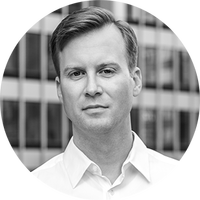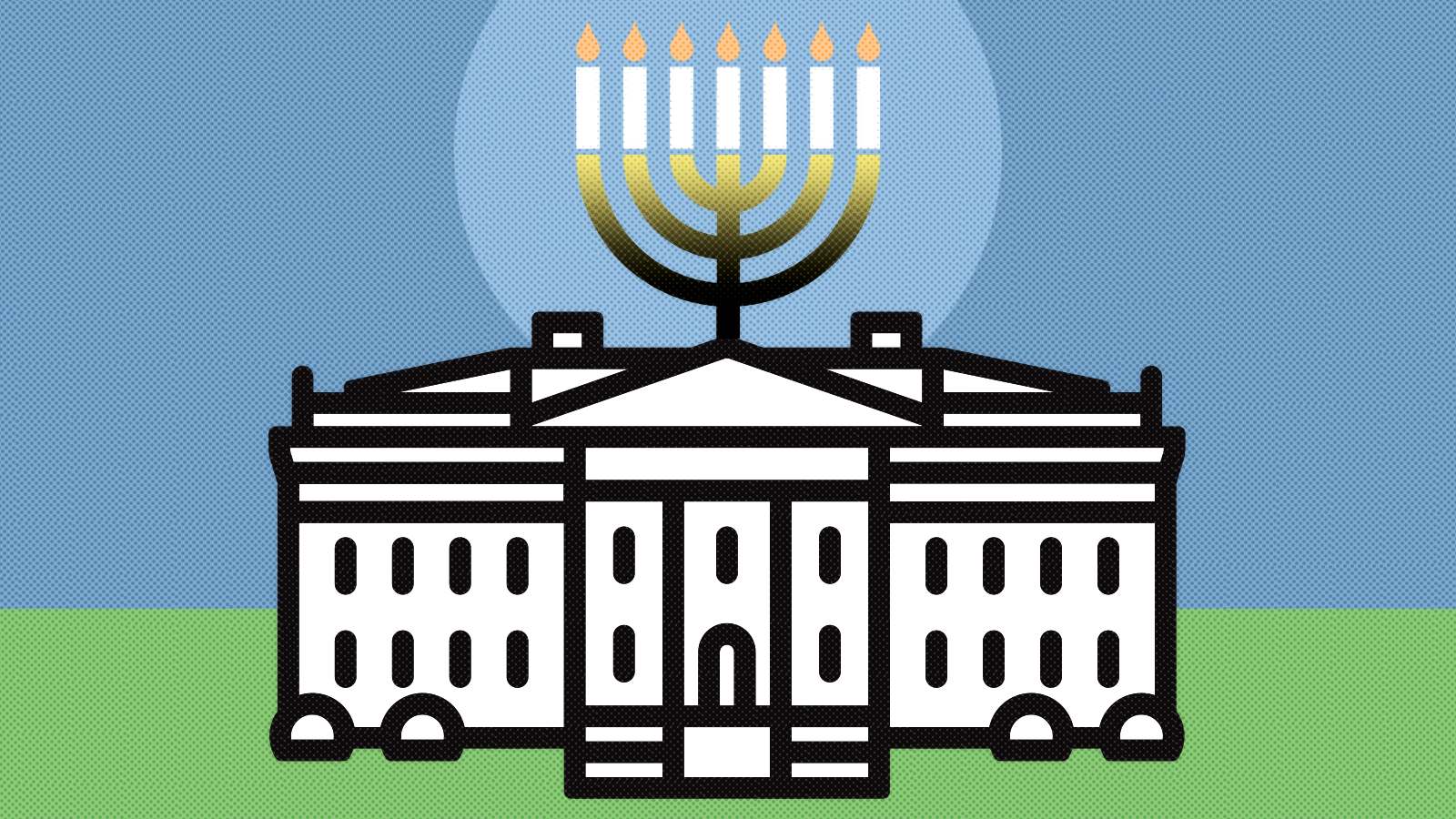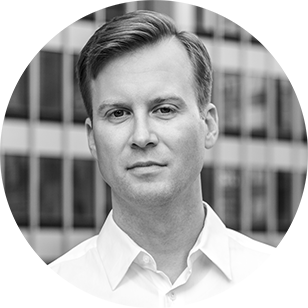The history and gravity of Hanukkah in the White House
What our first Jewish second gentleman means for America


A free daily email with the biggest news stories of the day – and the best features from TheWeek.com
You are now subscribed
Your newsletter sign-up was successful
The Biden White House will hold a Hanukkah party on Wednesday. The story of the Jewish holiday "teaches us that even a little bit of light, wherever it is found, can dispel the darkness and illuminate a path forward," President Biden said in a statement.
Yet the brightest light of this holiday season came earlier this week. On Sunday night, second gentleman Doug Emhoff, husband of Vice President Kamala Harris, spoke at the National Menorah lighting ceremony to celebrate the first night of Hanukkah. Emhoff is the first Jewish spouse of an American president or vice president, so his appearance meant far more than the usual ceremonial obligation political spouses are often asked to fulfill. Indeed, it underscored how the Biden White House represents a uniquely diverse administration in the history of the American presidency — and how honoring Emhoff's Judaism provides a powerful rebuke to resurfacing forces of intolerance in this country.
Jews have lived in North America since more than a century before the United States' founding, and American politicians, particularly presidents, have often hailed the nation's "Judeo-Christian tradition." Despite this long history, presidential observations of Hanukkah began only a little over 40 years ago. (White House Christmas celebrations, by contrast, date all the way back to 1800.)
The Week
Escape your echo chamber. Get the facts behind the news, plus analysis from multiple perspectives.

Sign up for The Week's Free Newsletters
From our morning news briefing to a weekly Good News Newsletter, get the best of The Week delivered directly to your inbox.
From our morning news briefing to a weekly Good News Newsletter, get the best of The Week delivered directly to your inbox.
In 1979, President Jimmy Carter became the first U.S. president to officially recognize the Festival of Lights when he walked to Washington's Lafayette Park and lit a 30-foot electronic menorah provided by a private Jewish group. The event didn't garner much attention — only a few newspapers even reported on it at the time — but it did set a new standard. Every president since Carter has participated in some ceremony or observation to commemorate the holiday.
It wasn't until 1989, though, that Hanukkah made it to the White House itself. That year, President George H.W. Bush played dreidel and sang Hanukkah songs with a group of children. He also displayed a menorah in the White House provided by the Synagogue Council of America. The next president, Bill Clinton, became the first to actually light a menorah in the White House. The tradition became an annual event during his presidency, none more infamous than the 1993 celebration where a six-year-old girl's ponytail brushed the menorah's flame and caught fire. Clinton quickly put it out with his hands.
It was President George W. Bush in 2001, however, who would hold the first official Hanukkah party in the White House. Before that, Clinton had invited Jewish leaders to his annual "holiday" parties, just one more example of how Hanukkah has been routinely subsumed in American life by the bigger Christmas season. But Bush, who frequently fused religion and politics in his presidency and also worked to build strong alliances between his administration and Jewish Americans, seemed to recognize that Hanukkah deserved its own separate occasion.
The events of 9/11 may have also shaped his decision that year. Just months after the terrorist attacks, Bush used the White House holiday celebrations to assert America's pluralist tradition and religious diversity as a source of national strength. Of the menorah that would be lit in the White House residence — also a first — Bush said it was "a symbol that this house may be a temporary home for Laura and me, but it's the people's house, and it belongs to people of all faiths."
A free daily email with the biggest news stories of the day – and the best features from TheWeek.com
Of course, it is a house only Christian families have inhabited. That's why Emhoff's place in the Biden presidency matters so much. And in his short time as second gentleman, Emhoff has publicly lived his Jewish faith. Last spring, he presided over the White House's first-ever Passover Seder. "Now this is a moment of many firsts," he rightly observed at the time, a nod to the multiple ways both he and his wife have made history. Recently, Emhoff announced he and Harris had affixed a mezuzah, a sacred object that marks the sanctity of a Jewish home, to the doorway of the vice presidential residence.
But this celebration of Hanukkah may be Emhoff's most significant contribution to presidential religious history. While a handful of recent presidents, vice presidents, and first ladies have dutifully recognized Hanukkah as a gesture of inclusion and belonging, Emhoff's actual observance of the holiday in the vice presidential residence powerfully demonstrates that Jews and other non-Christians belong at the center of American power instead of merely being its subjects. As Emhoff said at Sunday's menorah lighting, "Let us remember always that Jewish history is American history; our values, American values."
With rising antisemitism and an increase in hate crimes against Jews in recent years, that message is desperately needed. A recent study by the American Jewish Committee, which found one in four American Jews reported being the targets of antisemitism in the previous year, only underscores the urgency.
Having the first Jewish second gentleman following an administration whose president spoke in 2017 of "very fine people on both sides" of the antisemitic, white nationalist rally in Charlottesville won't heal the nation's deepest divisions or excise its worst religious prejudices. Still, it can shape history in meaningful ways. That much was apparent on Sunday night as Emhoff used his remarks at the menorah lighting to speak of the "hostility, violence, and discrimination" that threaten Jewish Americans' freedom and lives. "We must speak truth about this epidemic of hate," he said.
That unvarnished truth has rarely been a part of presidential observances of Hanukkah before. It's striking that Emhoff wants Americans to see the holiday not as an uncontroversial celebration of diversity and inclusion, as so many presidential administrations have. He spoke of it instead as an urgent call to fight the gathering darkness with Hanukkah's shining light.
Neil J. Young is a historian and the author of We Gather Together: The Religious Right and the Problem of Interfaith Politics. He writes frequently on American politics, culture, and religion for publications including The New York Times, The Atlantic, the Los Angeles Times, HuffPost, Vox, and Politico. He co-hosts the history podcast Past Present.
-
 What to know before filing your own taxes for the first time
What to know before filing your own taxes for the first timethe explainer Tackle this financial milestone with confidence
-
 The biggest box office flops of the 21st century
The biggest box office flops of the 21st centuryin depth Unnecessary remakes and turgid, expensive CGI-fests highlight this list of these most notorious box-office losers
-
 What are the best investments for beginners?
What are the best investments for beginners?The Explainer Stocks and ETFs and bonds, oh my
